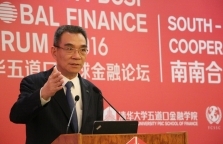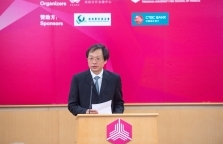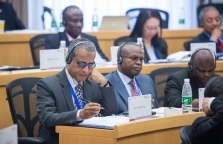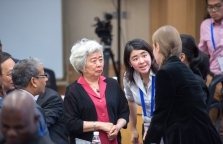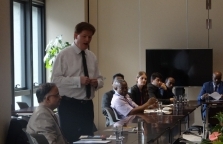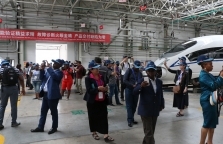The first “South-South Education Program for Economics and Finance” co-organized by the Finance Center for South-South Cooperation (FCSSC) and Tsinghua University PBC School of Finance (Tsinghua PBCSF) was successfully held with approaching to the final graduation ceremony on June 5, 2016. On receiving the certificate from the representative of FCSSC, and Mr. Liao Li, the Executive Associate Dean of PBCSF, 24 participants from 19 countries and districts including Nigeria, South Africa, Tajikistan, Myanmar, etc. formally finished the one-week training program about the development of China’s economy and financial markets.
This program was officially launched on May 30 in Tsinghua PBCSF. During the opening ceremony, Mr. Deng Wei, the Vice Chairperson of Tsinghua University Council, the representative of FCSSC and Madam Wu Xiaoling, the Board Chairwoman and Dean of Tsinghua PBCSF, delivered the opening remarks respectively, after which Madam Wu Xiaoling taught the first class over China’s financial system and reform.
On the afternoon of June 5, these senior financial officials and business elites of developing countries attended the Tsinghua PBC Global Financial Forum on South-South Cooperation. The participant representatives, Dr. Biru Paksha Paul, the Chief Economist of Bangladesh Bank and Mr. Benjamin T. Botchway, the Deputy Director in Charge of General Service of Ministry of Finance later joined a panel discussion on South-South Cooperation and “One Belt One Road”, together with the representative from FCSSC, Mr. Cao Yuanzheng, the Deputy Executive President and Chief Economist of the Bank of China International Holdings Limited, and Mr. Hu Wei, the Deputy General Manager of China CAMC Engineering Co. the representative of FCSSC and Dr. Lin Yifu, the founder of the Center for New Structural Economics at Peking University, gave the keynote speeches respectively.
Professional Training to Stimulate Global Development
To strengthen the bilateral and multilateral financial communication and cooperation among China and other developing countries, FCSSC and Tsinghua PBCSF jointly developed the “South-South Education Program for Economics and Finance” after one-year preparation, which drew overwhelming interest of most governments. The first program attracted financial or economic leaders from 19 countries and districts, such as Nigeria, South Africa, Brazil, Tajikistan, Myanmar, etc.
These financial elites were attracted to the valuable opportunities of closely discussing with Chinese financial experts, accomplishing a comprehensive and systematic understanding of Chinese financial development and achievements and in further learning from the Chinese developing and reform experience. This program aimed to build the bridge among financial leaders from the Global South, create an open platform for discussion over the role of finance in stimulating South-South Cooperation, the crucial role of China and the future opportunities and challenges in the face of all developing countries.
In the opening ceremony, Madam Wu introduced that “During the post-war decades, the objectives of pursuing world peace and equal cooperation have been recognized globally. Economic development, especially those related to developing countries, deeply affect the stability of global economic development, which has drawn world attention.”
“During the reform and openness period from year 1978 to 2010, China’s GDP has gain significant growth in amazingly fast speed around 10% each year. What’s the secret behind the figure? What’s the developing pattern of China? It’ll be valuable if China could share the experience with us as reference for Bangladesh to make development strategies.” said Dr. Biru Paksha Paul holding high expectation on the training.
“China is the leading developing country in Asia. I hope to learn from China’s experience of keeping the fast growth especially in the financial market.” Ms. Si Si Pyone, the Deputy Director-General of Treasury Department of Myanmar Ministry of Planning and Finance, expressed the same expectation, “As Myanmar is in the process of constructing the financial market, I lay specific interest in knowing the operation of China’s financial market.”
The Finance Center for South-South Cooperation (FCSSC) is a non-governmental, non-profit international organization founded in Hong Kong in April 2014. It is an integral platform which specializes in providing experience, knowledge, productivity and financing supports for South-South Cooperation and aims to promote pragmatic cooperation and partnerships between governments of developing countries, private enterprises, multilateral development institutions and international development assistance organizations. In addition, guided by successful models, FCSSC provides comprehensive solution plans for South-South Cooperation projects and uses financial services as means to assist countries of the global South to propel industrialization and achieve sustainable development, in an effort to make valuable contributions to the implementation of the 2030 Agenda for Sustainable Development.
This program was jointly funded by South South Education Foundation and CTBC Bank for the purpose of stimulating South-South communications through educational exchange.
An Immersive Experience to Explore the New Path to Economic Development
Tsinghua PBCSF invited numerous teachers to lecture at the “South-South Education Program for Economics and Finance”. The Board Chairwoman and Dean of the PBC School of Finance, Madam Wu Xiaoling, directed the first class, followed by Dr. Jia Kang, the former head of the research institute of the Ministry of Finance, Dr. Huang Guobo, the Director of the Foreign Exchange Reserves Management Department at China's State Administration of Foreign Exchange, Dr. Zhang Yansheng, the Secretary General of the Academic Committee of China’s National Development and Reform Commission, Dr. Jin Canrong from the Renmin University of China and Dr. Peng Kaiping from Tsinghua University.
During the seven-day program, apart from classes in the classroom, participants were also given the chance to visit government financial departments like the Chinese Securities Regulatory Commission (CSRC), as well as important financial institutions including the Bank of China, the People’s Bank of China, the Asian Infrastructure Investment Bank, The Silk Road Fund, the Import and Export Bank of China and the China Development Bank. Furthermore, it was especially arranged for participants to visit the CRRC Corporation for further learning.
In the process of these visits, each corporation emphasized the value of the “South-South Education Program for Economics and Finance” and particularly arranged the face to face discussion between their executives and the program participants. Dr. Qi Bin, the Director-General of the International Affairs Department at CSRC, expressed his anticipation and faith in future economic development of China, noting that the global financial system was becoming increasingly interconnected; in regards to China’s economy, he advised against focusing merely on statistics, instead emphasizing the direction of China’s development as a whole. Dr. Yao Yudong, the Director of the Institute of Finance at the People’s Bank of China, gave a detailed explanation on cash conversion cycles, discussing the internationalization of the Renminbi. Mr. Pan Yuehan, the Chief Risk Officer of the Bank of China, answered many questions from African participants about China’s foreign direct investment in Africa while emphasizing the importance of Sino-African trade relations. The visit to the Asian Infrastructure Investment Bank (AIIB) also saw the warm reception from Sir Daniel Alexander, the Vice President of AIIB and the former Chief Secretary to the UK Treasury, and Mr. Zander, the Senior Advisor to President. During a later visit to the Silk Road Fund, the company’s Assistant General Manager Ms. Zheng Xin specifically prepared a lecture for the participants to introduce the background of the global macro-economy, China’s economic power, China’s “One Belt One Road” initiative as well as the Silk Road Fund’s own goals and targets. Meanwhile, Dr. Liu Yong, the Chief Economist of China Development Bank, explained the concepts, modes and case studies of development financing. Then at the Import and Export Bank of China, managers from departments of strategic planning, company business, transportation financing, concessional loans etc. all participated in a close discussion with the participants, which made the exchange particularly valuable.
The Chinese high-speed rail is a flagship product of China’s exports to the world, which was firstly produced by the CRRC Corporation. The corporation hosts a world-class, high-end rail transportation equipment research and development base and is the birthplace of China's railway equipment manufacturing industry. During the visit to the CRRC Corporation, Vice President Mr. Yu Weiping talked about the influence of the railway development on people’s lives, from the perspective of the macro development of the railway industry. Professor Ju Jiandong, a visiting professor from Tsinghua PBCSF and also the Director of Center for International Economic Research, commented: “The CRRC Corporation started from importing and studying foreign technology. But it eventually became a leading enterprise in the industry through constantly promoting self-research and development, which is worth for others to draw lessons from.” Furthermore, the participants were allowed to examine the production lines of the CRRC, familiarizing themselves with the complete process of high-speed trains’ manufacturing, from the assembling plant to the debugging plant.
A Thorough Exchange to Have a Comprehensive Understanding the Status Quo of China’s Economy and Financial Markets
After seven days of learning, which involved activities ranging from attending lectures to visiting various organizations, participants highly appreciated the program that they had a more profound understanding of China.
“Despite having visited China multiple times beforehand and already being familiar with the country, I felt that this was a totally different experience. On previous trips, activities mostly involved group gatherings and sightseeing trips. The experience of visiting various financial institutions made this project particularly meaningful”, said Ms. Oluwarotimi Ajibola Aina, the Chief Administrative Officer of the International Economic Relation Department at the Ministry of Finance in Nigeria, going on to summarize that, “Because the content of my own work is very similar to that of the project’s, I was able to learn many new useful concepts and modes of operation. Especially during exchanges with the Bank of China and the China State Development Bank, I felt that their methodologies would be beneficial towards the establishment and development of Nigeria’s own banks.”
Dr. Biru Paksha Paul, the Chief Economist of the Bangladesh Bank commented: “Every session was unique, so it is difficult to say which I liked best. I remember Instructor Wu, Lee, etc. all taught me many new philosophies, especially the philosophical thinking behind China’s system design. Every lecture approached problems from a different perspective while company visits gave me the chance to familiarize myself with the whole environment of the financial sector.”
The “South-South Education Program for Economics and Finance” was Felipe Costi Santarosa’s first visit not only to China, but to Asia. Mr. Santarosa, who is Brazil’s Head of Financial and Tax Cooperation Division of the Ministry of External Relations, stated that he arrived as someone unfamiliar with China, due to the distance between the two countries. “Before coming to China, I felt that it was a very closed-off country. But upon my arrival, I discovered that the Chinese people were warm and enthusiastic, despite language remaining a barrier.” Moreover, he highly praised the program, commenting: “The content of this learning experience was absolutely satisfactory, outlining the diplomatic, economic and financial sides of issues all the while allowing me to grasp a deeper understanding of China on my first visit, no less. Especially, I had the opportunity to visit a few of China’s largest banks and even build a relationship with them; this was considerably helpful and allowed me to understand China’s financial sector more comprehensively.”
As the representative of FCSSC stated during the opening ceremony regarding the economic development of developing countries: “The implementation of the 2030 Agenda for Sustainable Development will allow each country to plan out its own development course. Through the experience sharing of China’s financial reforms, other countries will be able to better find and pave their own path of economic development, so that we can achieve the sustainable development goals to promote common development and mutual benefit.”
The “South-South Education Program for Economics and Finance” is one of FCSSC’s events aiming to facilitate South-South dialogue and exchanges, for the purpose of policy communication and coordination among the Global South. In the present age of globalization, one country’s development may have countless connections with the external world. After the global financial crisis in late 2000s, the Global South has been aware of the importance of communication and coordination. That’s why FCSSC would like to build a bridge of communication among the Global South, so as to facilitate exchanges and dialogues among South-South talents, as well as to share China’s experience of economic and financial reforms with other developing countries.

